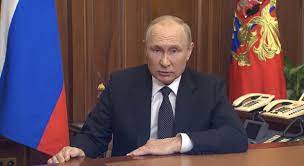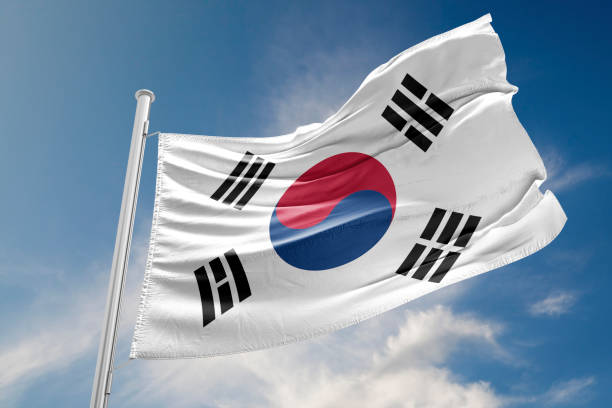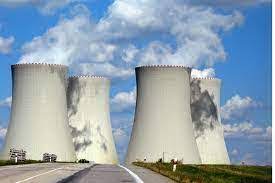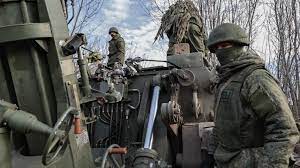Foreign News
Putin Escalates Ukraine War, issues Nuclear Threat to West

President Vladimir Putin on Wednesday ordered Russia’s first mobilisation since World War II and backed a plan to annex swathes of Ukraine, warning the West he was not bluffing when he said he’d be ready to use nuclear weapons to defend Russia.
In the biggest escalation of the Ukraine war since Moscow’s Feb.
24 invasion, Putin explicitly raised the spectre of a nuclear conflict, approved a plan to annex a chunk of Ukraine the size of Hungary, and called up 300,000 reservists.“If the territorial integrity of our country is threatened, we will without doubt use all available means to protect Russia and our people – this is not a bluff,” Putin said in a televised address to the nation.
Citing NATO expansion towards Russia’s borders, Putin said the West was plotting to destroy his country, engaging in “nuclear blackmail” by allegedly discussing the potential use of nuclear weapons against Moscow, and accused the United States, the European Union and Britain of encouraging Ukraine to push military operations into Russia itself.
“In its aggressive anti-Russian policy, the West has crossed every line,” Putin said.
“This is not a bluff. And those who try to blackmail us with nuclear weapons should know that the weathervane can turn and point towards them,” he added.
The address, which followed a critical Russian battlefield defeat in northeastern Ukraine, fuelled speculation about the course of the war, the 69-year-old Kremlin chief’s own future, and showed Putin was doubling down on what he calls his “special military operation” in Ukraine.
In essence, Putin is betting that by increasing the risk of a direct confrontation between the U.S.-led NATO military alliance and Russia — a step towards World War Three – the West will blink over its support for Ukraine, something it has shown no sign of doing so far.
Putin’s war in Ukraine has killed tens of thousands, unleashed an inflationary wave through the global economy and triggered the worst confrontation with the West since the 1962 Cuban Missile Crisis, when many feared nuclear war imminent.
Putin signed a decree on partially mobilising Russia’s reserves, arguing that Russian soldiers were effectively facing the full force of the “collective West” which has been supplying Kyiv’s forces with advanced weapons, training and intelligence.
Speaking shortly after Putin, Defence Minister Sergei Shoigu said that Russia would draft some 300,000 additional personnel out of some 25 million potential fighters at Moscow’s disposal.
The mobilisation, the first since the Soviet Union battled Nazi Germany in World War Two, begins immediately.
Such a move is risky for Putin, who has so far tried to preserve a semblance of peace in the capital and other major cities where support for the war is lower than in the provinces.
Ever since Putin was handed the nuclear briefcase by Boris Yeltsin on the last day of 1999, his overriding priority has been to restore at least some of the great power status which Moscow lost when the Soviet Union collapsed in 1991.
Putin has repeatedly railed against the United States for driving NATO’s eastward expansion, especially its courting of ex-Soviet republics such as Ukraine and Georgia which Russia regards as part of its own sphere of influence, an idea both nations reject.
Putin said that top government officials in several unnamed “leading” NATO countries had spoken of potentially using nuclear weapons against Russia.
He also accused the West of risking “nuclear catastrophe,” by allowing Ukraine to shell the Zaporizhzhia nuclear power plant which is under Russian control, something Kyiv has denied.
Putin gave his explicit support to referendums that will be held in coming days in swathes of Ukraine controlled by Russian troops – the first step to formal annexation of a chunk of Ukraine the size of Hungary.
The self-styled Donetsk (DPR) and the Luhansk People’s Republics (LPR), which Putin recognised as independent just before the invasion, and Russian-installed officials in the Kherson and Zaporizhzhia regions have asked for votes.
“We will support the decision on their future, which will be made by the majority of residents in the Donetsk and Luhansk People’s Republics, Zaporizhzhia and Kherson,” Putin said.
“We cannot, have no moral right to hand over people close to us to the executioners, we cannot but respond to their sincere desire to determine their own fate.”
That paves the way for the formal annexation of about 15 per cent of Ukrainian territory.
The West and Ukraine have condemned the referendum plan as an illegal sham and vowed never to accept its results.
French President Emmanuel Macron said the plans were “a parody.” Kyiv has denied persecuting ethnic Russians or Russian-speakers.
But by formally annexing Ukrainian territories, Putin is giving himself the potential pretext to use nuclear weapons from Russia’s arsenal, the largest in the world.
Russia’s nuclear doctrine allows the use of such weapons if weapons of mass destruction are used against it or if the Russian state faces an existential threat from conventional weapons.
“It is in our historical tradition, in the fate of our people, to stop those striving for world domination, who threaten the dismemberment and enslavement of our Motherland, our Fatherland,” Putin said.
“We will do it now, and it will be so,” said Putin. “I believe in your support.” (NAN)
Foreign News
President Yoon Banned from Leaving South Korea

The South Korean Government ordered an overseas travel ban on President Yoon Suk Yeol.The South Korean news agency Yonhap reported on Monday that the travel ban is due to the ongoing investigation into Yoon, which involves suspicion of high treason.Yoon unexpectedly imposed martial law on his country last Tuesday night, but hours later, after massive political resistance, he repealed the order.
On Saturday evening, a motion by the opposition to impeach the president in parliament failed. However, public pressure against the 63-year-old continues. (dpa/NAN)Foreign News
Israel Threatens to Expand War if Hezbollah Truce Collapses

Israel threatened on Tuesday to return to war in Lebanon if its truce with Hezbollah collapses and said this time its attacks would go deeper and target the Lebanese state itself, after the deadliest day since the ceasefire was agreed last week.
In its strongest threat since the truce was agreed to end 14 months of war with Hezbollah, Israel said it would hold Lebanon responsible for failing to disarm militants who violated the truce.
“If we return to war we will act strongly, we will go deeper, and the most important thing they need to know: that there will be no longer be an exemption for the state of Lebanon,” Defence Minister Israel Katz said.
“If until now we separated the state of Lebanon from Hezbollah… it will no longer be (like this),” he said during a visit to the northern border area.
Despite last week’s truce, Israeli forces have continued strikes in southern Lebanon against what they say are Hezbollah fighters ignoring the agreement to halt attacks and withdraw beyond the Litani River, about 30 km (18 miles) from the frontier.
On Monday, Hezbollah shelled an Israeli military post, while Lebanese authorities said at least 12 people were killed in Israeli airstrikes on Lebanon.
Katz called the Hezbollah attack “the first test” and described Israel’s strikes as a strong response.
The Beirut government must “authorise the Lebanese army to enforce their part, to keep Hezbollah away beyond the Litani, and to dismantle all the infrastructure,” Katz said.
“If they don’t do it and this whole agreement collapses then the reality will be very clear.”
Top Lebanese officials urged Washington and Paris to press Israel to uphold the ceasefire, after dozens of military operations on Lebanese soil that Beirut has deemed violations, two senior Lebanese political sources told Reuters on Tuesday.
The sources said caretaker Prime Minister Najib Mikati and Speaker of Parliament Nabih Berri, a close Hezbollah ally who negotiated the deal on behalf of Lebanon, spoke to officials at the White House and French presidency late on Monday.
Mikati, quoted by the Lebanese news agency, said that diplomatic communications had intensified since Monday to stop Israeli violations of the ceasefire.
He also said a recruitment drive was under way by the Lebanese army to strengthen its presence in the south.
U.S. State Department spokesperson Matt Miller told reporters on Monday that the ceasefire “is holding” and that the U.S. had “anticipated that there might be violations”.
Neither the French presidency nor the foreign ministry were immediately available to comment.
French Foreign Minister Jean-Noel Barrot spoke to his Israeli counterpart Gideon Saar on Monday, saying both sides should adhere to the ceasefire.
The truce came into effect on Nov. 27 and prohibits Israel from conducting offensive military operations in Lebanon, while requiring Lebanon to prevent armed groups including Hezbollah from launching attacks on Israel.
It gives Israeli troops 60 days to withdraw from south Lebanon.
A mission chaired by the United States is tasked with monitoring, verifying, and helping enforce the truce, but it has yet to begin work.
Berri on Monday called on the mission to “urgently” ensure Israel halts its breaches, saying Beirut had logged at least 54 Israeli violations of the ceasefire so far.
Israel has said its continued activity in Lebanon is aimed at enforcing the ceasefire.
Lebanon’s Mikati met in Beirut on Monday with U.S. General Jasper Jeffers, who will chair the monitoring committee.
Two sources familiar with the matter told Reuters that France’s representative to the committee, General Guillaume Ponchin, would arrive in Beirut on Wednesday and that the committee would hold its first meeting on Thursday.
“There is an urgency to finalise the mechanism, otherwise it will be too late,” the source said, referring to Israel’s gradual intensification of strikes even with the truce in place. (Reuters/NAN)
Foreign News
Starmer Rules out Re-running UK Election as Petition Gets Signatures

British Prime Minister Keir Starmer has ruled out calling another general election, but said he is “not surprised” some people who did not support his party, Labour, might want a second poll.
A petition on Parliament’s website calling for another election has now been signed by more than two million people.
“I would like there to be another general election,” it reads.
“I believe the current Labour Government have gone back on the promises they laid out in the lead-up to the last election.
”Asked about the petition on ITV’s “This Morning” programme on Monday, Starmer said: “Look, I remind myself that very many people didn’t vote Labour at the last election.
“I’m not surprised that many of them want a re-run. That isn’t how our system works.
“There will be plenty of people who didn’t want us in the first place.
“So, what my focus is on is the decisions that I have to make every day.”
He characterized decisions taken so far by his government as “tough but fair.”
Starmer and his ministers have faced a particularly strong backlash for limiting winter fuel payments to only the poorest pensioners.
Farmers have also protested over changes to inheritance tax which they claim could affect the future of their businesses.
As he marks five months as prime minister, Starmer acknowledged the job has been difficult, but added: “I wouldn’t swap a single day in opposition for a day in power.
“It’s much better to be in power to do things, rather than the frustration, as I found it, in opposition for all of those long years where we were just able to say what we would do.”
The petition calling for another general election is open for signatures until May 2025.
While the vast majority of those signing it are from the UK, it has also gained support from other countries.
More than 1,200 people from the U.S. have added their names to it, with similar a number from France doing the same.
American signatories may have been made aware of the petition by Elon Musk, the businessman and ally of President-elect Donald Trump.
He shared the petition on X, the social media site he owns formerly known as Twitter, claiming “the people of Britain have had enough of a tyrannical police state”.
Starmer’s office sought to avoid being drawn into a war of words with Mr Musk.
The prime minister’s official spokesman added Starmer was “focused on the issues that matter most to the British people.”
Although it has garnered media attention and millions of signatures, it is far from the largest petition received through the Parliament website, or the one which has seen the most rapid take-up.
In 2019, some 6.1 million people signed a petition calling for the revocation of Article 50 and for the United Kingdom to remain in the European Union, four million of whom did so in 48 hours.
The second most-signed petition gained 4.1 million signatures.
The 2016 petition called for a second referendum on the UK’s membership of the European Union following the Brexit vote.
Because the election petition has received 10,000 signatures, ministers will issue a response to it.
MPs may consider it further in a Westminster Hall debate because it has been signed by more than 100,000 people, although this is not guaranteed.
A petition which has successfully made it to debate is one calling for social media companies to ban under 16-year-olds from their platforms after it received more than 110,00 signatures.
Another calling for the law around school term-time holidays to be relaxed, which received 250,000 signatures, was due for debate on Monday afternoon.
Michael Westwood, the man who started the petition, has confirmed he voted Conservative at the summer election.
But he told Talk TV he did not know if this would be the case again, adding: “One thing’s for certain, I wouldn’t be voting Labour.”
Among those sharing the petition online was retired actor Sir Michael Caine, who has been critical of Labour governments in the past. (PA Media/dpa/NAN)



























